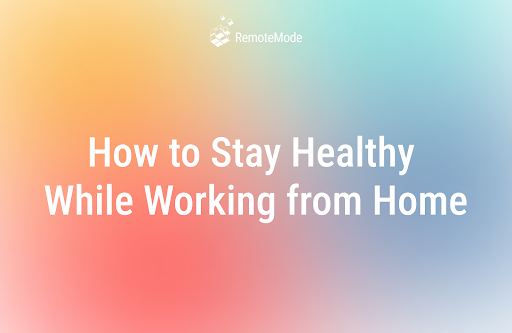How Remote Work Encourages Diversity

The pandemic has forced many companies to reevaluate the way they operate. For many, this has meant a shift to remote work. While this transition in operating structure has been challenging, it has also created new opportunities for enhancing diversity and inclusion in the workplace. One of the biggest advantages of companies offering remote work is that it gives employees the flexibility to work from anywhere. This feature opens up organizations to a much more diverse pool of talent. Additionally, remote work can help break down barriers that prevent underrepresented groups from accessing opportunities within a company.
The growing popularity of remote work has had a ripple effect on company culture, with a renewed focus on diversity and inclusion. Feeling a sense of belonging as a remote worker can be difficult. After all, how do you build trust and rapport with someone you've never met in person? Bias can play a role in physical interactions, and it can be easy to feel like an outsider in a virtual meeting. While there are milestones to go with diversity and inclusion across companies, remote work has created opportunities in shaping the future of equitable work.
Companies can reach a more diverse talent pool
Before remote work exploded in popularity, companies undergoing recruiting had to hire within their region. With disproportionate demographic compositions in cities across the US, organizations would inevitably face diversity hiring challenges. Many rural or suburban companies don't have access to diverse talent pools. With the onset of remote work, companies aren't bound to a specific geographic location for hiring. This allows them to attain a more diverse candidate pool. Reaching a national or global talent pool in recruiting practices increases a company's exposure to diversity hiring and breaks down physical barriers to recruiting. Remote work is revolutionizing the way hiring is conducted, giving candidates the ability to choose where they'd like to live while contributing a wide array of perspectives, ideas, and talents to a remote organization.
People with disabilities have greater access at work
According to the US Census Bureau, 56.7 million Americans live with a disability, of which over 6 million are in the workforce. Commuting to work daily adds up hours to any employee's routine. While this process can be tiresome, it can be worse for employees with disabilities. Navigating back and forth from work can be a significant barrier for those with mobility limitations, resulting in additional burnout at work. Remote work eliminates the physical challenge and strain of commuting, giving employees more options for managing their physical disabilities.
Long commutes can be difficult for people with physical disabilities, but navigating the physical workspace can be another significant challenge. Many offices in the US are often constrained by inaccessible design, making it difficult for people with disabilities to thrive in the workplace - let alone accept an offer to work there. Many highly qualified candidates have to turn down roles because offices are not designed with accessibility in mind. By working remotely, employees have the opportunity to work successfully at home, increasing the level of inclusion and access for disabled workers.
Employees can create better safe spaces
While today's workplace has advanced significantly over the decades in terms of etiquette and respect, there are obstacles to creating authentic, safe spaces for all in the office. In physical work locations, many groups of employees may not always feel secure expressing their authentic selves. This feeling can be due to the pressures of code-switching - the act of changing one's appearance or mannerisms to fit in with the majority group. Code-switching and other barriers can be taxing and reduce motivation for marginalized employees. In remote work environments, there is less pressure to present oneself in a certain way. This can create a more inclusive workplace, as bias is reduced when visual cues are not as important in our perception of each other. As a result, remote work can create a safer space for marginalized groups to express themselves and have more control over their interactions without conforming to potentially uncomfortable situations in the office.
Remote work helps reduce the gender gap
The lack of accessible childcare options is a significant obstacle for women with families advancing in their careers. This problem is alleviated by remote work policies that allow moms with children or other dependents more flexibility in balancing their caregiving responsibilities with their jobs. As a result, employees can balance their parental duties more seamlessly, without the pressures of commuting. Because of remote work, women who have families won't face the limitations of juggling their careers and motherhood. While many significant changes are needed to reach pay parity, remote work is critical to empowering women to thrive in the workplace.
Final thoughts
When it comes to building diversity outcomes in the workplace, remote work has a lot to offer. Companies can tap into a much wider pool of talent and set up employees for success in the workplace. However, inclusion is still an ongoing battle that isn't directly addressed by remote work. Companies need to continuously invest in cutting-edge initiatives to create a genuinely inclusive environment. These can include Employee Resource Group (ERG) virtual events to foster community for marginalized groups. Another initiative is to create experiences for employees to interact with the current trends in building a more equitable society. By engaging in these dialogues and community activities, companies can go beyond recruiting diverse candidates and into propelling their careers forward.
Ultimately, everyone wants to belong. Whether it's with friendships or at work, the need for community is prominent in all of us. When recruiting for remote work, candidates can look for companies committed to diversity and inclusion to strengthen their connection with their work and peers. These companies will be more likely to create an environment where everyone feels valued and respected, no matter where they are located or their background.
RemoteMode's full-cycle program gives you access to career advisors who will help you navigate your remote tech job search. From improving your resume to connecting you with employers, you can find companies that emphasize diversity and inclusion in their business models.
Contact a RemoteMode career counselor to learn more about your options in finding forward-thinking companies that highlight diversity in their recruiting.
Excerpt
The remote work revolution has presented challenges and opportunities for organizations regarding diversity and inclusion. On the one hand, remote work can limit the sense of belonging among employees. On the other hand, remote work has broken down geographical barriers to hiring, opening up organizations to a more diverse pool of candidates. Additionally, remote work can create a safer space for marginalized groups to express themselves and be heard. As remote work continues to grow, it's essential that we continue to track the effect of remote work on inclusive practices.
Take the first step to your new remote career!






